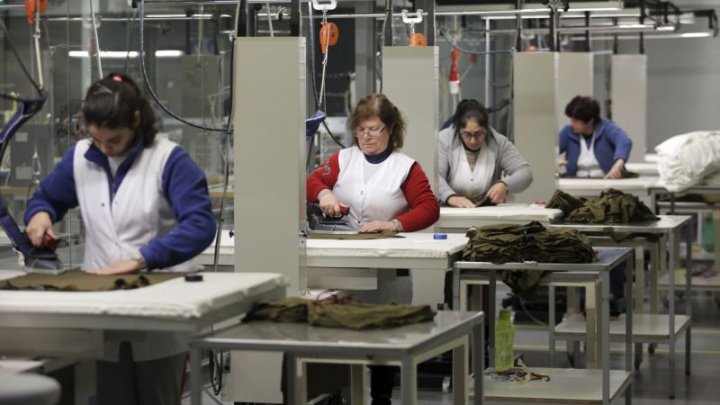Portugal garment workers fear loss of jobs post-Brexit
 foto: PUBLIKA.MD
foto: PUBLIKA.MD
More than 120 workers at the Pedrosa & Rodrigues garment factory in northwest Portugal are concerned for their future as Brexit threatens to snatch away their livelihoods.
Sales to Britain make up about half of Pedrosa & Rodrigues' annual revenue of around 14 million euros (16 million US dollars).
But the United Kingdom's impending departure from the European Union could make "Made in Portugal" labels less attractive as borders go back up between Britain and the bloc.
The company's client relations manager says the worst case scenario will be losing around seven million euros a year (8 million US dollars).
Companies like Pedrosa & Rodrigues fear they could be part of the collateral damage from Britain's withdrawal from the EU's single market.
As Brexit-inspired economic adjustments ripple across the bloc, small countries like Portugal could feel a lot of economic pain, though the extent of the disruption remains unclear because the terms of Britain's divorce remain unresolved.
Some economic forecasts have produced scary numbers.
The Portuguese government says Brexit could wipe out up to 26 percent off Portuguese exports of goods and services and shave one percentage point off the country's GDP.
In Portugal, which has had close ties with Britain since the Treaty of Windsor in 1386, the textiles sector based in the northwestern area is one of the country's most exposed industries and it is largely located in what is one of Portugal's and western Europe's poorest regions.
The textile companies have already felt a chill, with sales to Britain dropping by more than three percent since the 2015 UK Brexit referendum, according to Paulo Vaz, the director-general of the Portuguese Textile and Clothing Association, which represents the owners of about 500 companies in the sector.
He puts that down to the weakening pound - which makes purchases from countries that use the euro, like Portugal, more expensive - and cautious spending by British consumers at a time when their financial future is uncertain.
"We're talking about a market that is our fourth-largest, that's worth around 450 million euros (516 million US dollars) a year to us and that was growing, and that now can be severely harmed by all this," Vaz said.
For some businesses, like Pedrosa & Rodrigues, the British market is their lifeblood.
The Pedrosa & Rodrigues two-floor factory sits amid green fields on the fringes of a small town in Portugal's industrial heartland, where textile companies are an economic mainstay and provide some 130,000 jobs.
Inside, there is a hum of sewing machines, hissing irons and a rumble of high-tech cloth-cutting machines.
Ana Pedrosa Rodrigues remembers sitting as a child on the running boards of these machines after her parents started the company with five employees in a garage in 1982.
Ana and her two elder brothers recently joined their parents at the company.
The other employees include husbands and wives, fathers and sons, brothers and sisters.
Generations of workers are common in the industry.
Almost all of the workers live in this town, many of them within walking distance, and have served on average 19 years.
Pedrosa & Rodrigues has prospered in part by selling "affordable luxury" brands to some of Britain's well-known fashion labels.
The company makes ME+EM t-shirts that can be found at Selfridge's in London and produces some of the All England Club's range of Wimbledon tennis clothes.
In an ironic twist, it also delivers to British brand L.K. Bennett, a label occasionally worn by British Prime Minister Theresa May.
Every Friday, workers stack dozens of brown cardboard boxes at the factory's loading bay and place them on trucks for the 2-3 day trip to warehouses in the British Midlands.
At the moment, the trucks drive straight across the EU's open borders.
If they are shut, the paperwork, delays and tariffs could add 12 percent to the cost price.